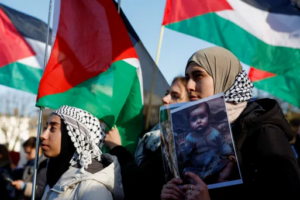What has the ICJ ordered Israel to do on Gaza war and what’s next?

Pro Palestinian demonstrators outside the International Court of Justice as judges rule on emergency measures against Israel following accusations by South Africa that the Israeli military operation in Gaza is a state led genocide, 26 January 2024
Areesha Lodhi writes in Al Jazeera on 26 January 2024:
The International Court of Justice (ICJ) issued Israel with six orders in relation to its bombardment of Gaza on Friday, but stopped short of calling for a full ceasefire.
The emergency measures were announced as the court begins its deliberations on South Africa’s genocide case against Israel, for which it heard evidence earlier this month. South Africa has described Israel’s actions in Gaza as genocide but Israel has rejected the allegation, claiming that its activities in Gaza stem from “self-defence”, and are necessary to root out Hamas. It has added that the war cannot end until that goal has been achieved.
In a 45-minute judgement at the court in the Hague on Friday, presiding judge Joan Donoghue rejected Israel’s claim that the court lacks jurisdiction to hear South Africa’s case against it.
Israel said that South Africa failed to adequately communicate with Tel Aviv about the case before filing the application, as is required by the court’s own rules. However, the court rejected this argument, stating that South Africa had made a complaint to the Israeli embassy in Pretoria, to which Israel had clearly responded. Therefore a “dispute” over the interpretation of the law relating to genocide exists. South Africa has clear standing to submit its case, the court ruled.
South Africa had also requested nine emergency measures be taken against Israel by the court. The ICJ directed Israel to implement six.
Israel’s war on Gaza has already killed more than 26,000 Palestinians in the besieged enclave. Israel’s blockade on the strip has also severely restricted access to food, water, fuel and medical support.
Here is what you need to know about the ruling, its impact, and what might happen next.
What is in the ICJ’s ruling?
The ICJ confirmed that it does have jurisdiction to hear the case submitted by South Africa and issued six emergency orders to Israel, as follows:
Israel must take all possible measures to prevent acts as outlined in Article 2 of the 1948 Genocide Convention. This entails not killing members of a particular group (in this case, Palestinians), not causing physical or psychological harm to members of that group, not inflicting living conditions which are calculated to bring about the end of the existence of a people, and not carrying out actions designed to prevent births within that group of people.
Measure approved by a vote of 15-2. Dissenting judges: Judge Julia Sebutinde of Uganda and the Israeli representative, Judge Aharon Barak.
Israel must ensure its military does not carry out any of the above actions.
Measure approved by a vote of 15-2. Dissenting judges: Judge Sebutinde of Uganda and the Israeli representative, Judge Barak.
Israel must prevent and punish the “direct and public incitement to commit genocide in relation to members of the Palestinian group in the Gaza Strip”.
Measure approved by a vote of 16-1. Dissenting judge: Judge Sebutinde of Uganda.
Israel must ensure the delivery of basic services and essential humanitarian aid to civilians in Gaza.
Measure approved by a vote of 16-1. Dissenting judge: Judge Sebutinde of Uganda.
Israel must prevent the destruction of evidence of war crimes in Gaza and allow fact-finding missions access.
Measure approved by a vote of 15-2. Dissenting judges: Judge Sebutinde of Uganda and the Israeli representative, Judge Barak.
Israel must submit a report on all steps it has taken to abide by the measures imposed by the court within one month of the judgement. South South Africa will have the chance to respond to this report.
Measure approved by a vote of 15-2. Dissenting judges: Judge Sebutinde of Uganda and the Israeli representative, Judge Barak.
